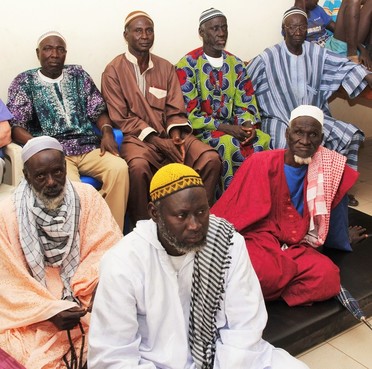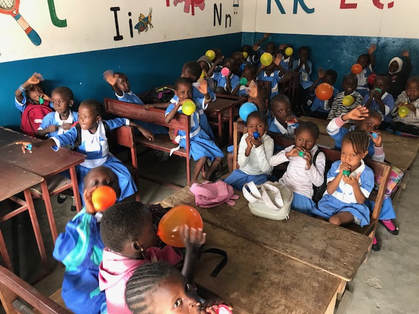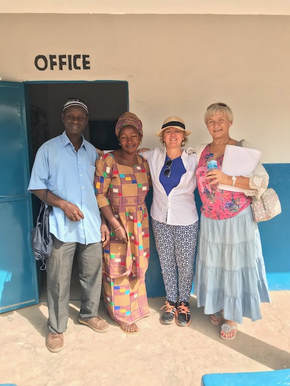 Chief Dampha is on the right Chief Dampha is on the right By Dee Bixley As UK Directors of the African Oyster Trust, one of the privileges for me and Steve Emery is gaining some understanding of how things are run in a small African country. Here’s a little of what we learned about Chiefdom. There is a Chief at the head of every District within The Gambia. A District is a cluster of villages under one administrator: The Chief. In Jappineh Jarra Central (where many of the Trust’s projects are based) Alhagie Bakary Dampha has held this powerful role for many years. We asked Kira Dalton to outline the role of a Chief and this is what she told us: “A Chief spends a lot of time on official duties. Together with his Deputy, he oversees a team of Elders and they mediate in land disputes, family feuds, and other domestic situations. He presides over a Chief’s Court, attends numerous formal events, and is summoned to the capital, Banjul, for official functions. “Chiefs are held in high esteem,” she continues. “They work with Alkalos (mayors) and local Imams, who lead Islamic worship services, provide community support and spiritual advice. “As with any other male Muslim, a Chief is allowed up to four wives. However, as with most Gambian men, he is rarely seen in public with any of his wives. Males and females live almost entirely separate lives. Even when you invite a group of Gambians round for dinner or to a party, within minutes men and women are in separate areas talking only to others of the same sex. This happens however much we try to get them to mix! “In a typical family compound the husband has his own room, and each wife has her own living quarters, which she shares with her children until they reach puberty. The wives become almost like sisters - sharing the chores ordered by the Senior Wife.” Given this very different way of life, we are keen to know how the Chief relates to Kira. After all, she is an exceedingly capable white lady, who arrived in their midst and proceeded to transform the lives of many of his people. “I would describe my relationship with the Chief as one of ‘healthy mutual respect’. Sometimes he jokes about me being an honorary Gambian citizen! I think the way he copes is by treating me as an honorary man. For example, at any gathering it is expected that I will eat with the men, firstKemo Bah, our Education Director, and Gambian Management Team Secretary, adds:  The Chief, top right, with Imams & Elders The Chief, top right, with Imams & Elders “Chiefs are important persons in their communities and they command profound respect from their subjects. Chiefs rarely retire; they are either dismissed, deposed, or they die in post. “In the case of any disagreement, most of their subjects retreat with respect. Some years ago, challenging them would have been unthinkable but now a Chief’s authority can be seriously contested. “His Excellency the President of the Republic, Sheikh Professor Dr. Alhaji Yahya A.J.J. Jammeh (the former President) dismissed many chiefs, replacing them without election. “Chief Alhagie appreciates the numerous developments brought to the Jappineh area by Lady Kira Dalton and the African Oyster Trust. The Health Centre has helped to curb the menace of some diseases and patients come from far and wide for treatment. The Chief knows that such improvements in health have transformed the welfare of the people in the district and beyond. In schooling too, the charity’s intervention has brought excellent results, as seen in recent countrywide national examinations.” Kemo finished by sending the Chief’s ‘… profound greetings to the UK management team’. We appreciate his thanks for our efforts; sometimes he even invites us to “E-x-t-e-n-d Your Efforts!”
0 Comments
 It was our first morning in The Gambia, the week before Christmas. Lady Kira Dalton, a Trust Director, met us by reception at our hotel at Kombo Beach, as arranged. We’d heard about the African Oyster Trust via James Holden, a founder member, and were curious to learn more. We bundled into Kira’s car, which had all the hallmarks of a local vehicle, covered with a liberal coating of dust. We drove through the streets of Banjul while Kira filled us in on the back story, about how the population has multiplied from 1.1 million to 1.8 million in the space of five years. We were told that 70% of the population is under 35, but of those 70% were unemployed. A fact exacerbated by the migration of many young people from the villages to the city seeking work. There were children everywhere. We drove past the traffic lights (of which there are four sets in Gambia, although only a couple are working) along dusty roads. We shared the highway with donkeys and mules pulling carts, with mini buses crammed with locals, their roofs pled high with luggage. It was an assault on the senses. Life is colourful and vibrant here. Bright fabrics are worn by the women, fashioned into graceful dresses and elaborate headdresses. Bustling street markets display produce in baskets, livestock and all manner of household utensils, furniture and firewood. While this colourful chaos may be interesting to see, the reality for people living here is that life is tough. It’s a case of survival for many. Gambia is not a wealthy country. Far from it, about a third of the population lives in poverty; employment is scarce; people struggle to feed themselves; the government has questionable probity; the medical care must be paid for; education is limited. These economic forces drive many young Gambian men to seek a better future in Europe. It is against this backdrop that the African Oyster Trust operates. Stepping Stones Nursery Kira drove us to Serrakunda, the Gambia’s biggest city, to visit the Stepping Stones nursery. On our arrival we were met by a sea of smiling faces. Stepping Stones is clearly a happy place to be. It boasts fresh water, purpose-built school rooms, a good play area, clean loos, and dedicated staff. The children were very well behaved, sitting at their desks in the four classrooms, under the watchful eye of a member of staff. Class sizes are limited to thirty. This nursery education gives a great head-start in life and puts them at an advantage when they begin junior school where class sizes can be as large as 60 to 90 children per teacher. Not a great ratio for learning. While they speak different Gambian dialects amongst themselves, at Stepping Stones these three and four-year-olds learn English. Colourful images of the alphabet decorate the walls. One young by was acting as prompter, pointing to the days of the week on the backboard and getting the rest of the class to repeat the days. We handed out balloons to the younger children, while the older ones received pens. They were all very polite and said thank you. The lesson stopped, and break started. Instantly we were surrounded by eager youngsters all trying to shake our hands. The classroom emptied, and the playground filled up. The boys at one end kicking a football around (football and the Premier League is like a religion in Africa) while the girls played skipping and gossiped at the other end.  Compare and contrast After Stepping Stones, Kira took us to see a state-run nursery not far away where one of her teachers had been parachuted in to sort it out. This was in sharp contrast to the environment we had just come from. It was dirty, shabby and overrun with children. The classrooms were sorely in need of a coat of paint. The alphabet pictures were peeling off the walls. But the new head was beginning to get the place in order. No mean feat when the class sizes were 60+ in a classroom designed for 30. It made us appreciate how well the Stepping Stones model worked by comparison. A humbling experience Our visit to Stepping Stones took place just before the Christmas break. It was an education for us. It was also a joyous and at the same time humbling experience; humbling to see what had been achieved by the Trust and how this small group of individuals had taken it upon themselves to be a positive force for change against a backdrop of seemingly overwhelming odds. Coming back to the UK and filling up my supermarket trolley with food for Christmas gave me a sense of guilt, to have so much compared to the little that the Gambians have to survive on. All credit to Kira and her team for their dedication and commitment to making a difference to these young lives. We would urge everyone to make whatever contribution they feel they can to support them in their work and if you ever get the chance to go to The Gambia be sure to call in to the Stepping Stones nursery. Don’t forget to take some balloons and pens with you! |
News DiaryThe News Diary is a regular account of all that is happening at The African Oyster Trust. Please pop back for regular updates, follow us on Twitter or sign up for our RSS feed to have the latest news sent straight to your computer! AuthorsThe news diary is written by a number of people close to the work of the African Oyster Trust, including founder James Holden, his co-directors, trustees and volunteers. Archives
February 2024
Categories
All
|

 RSS Feed
RSS Feed